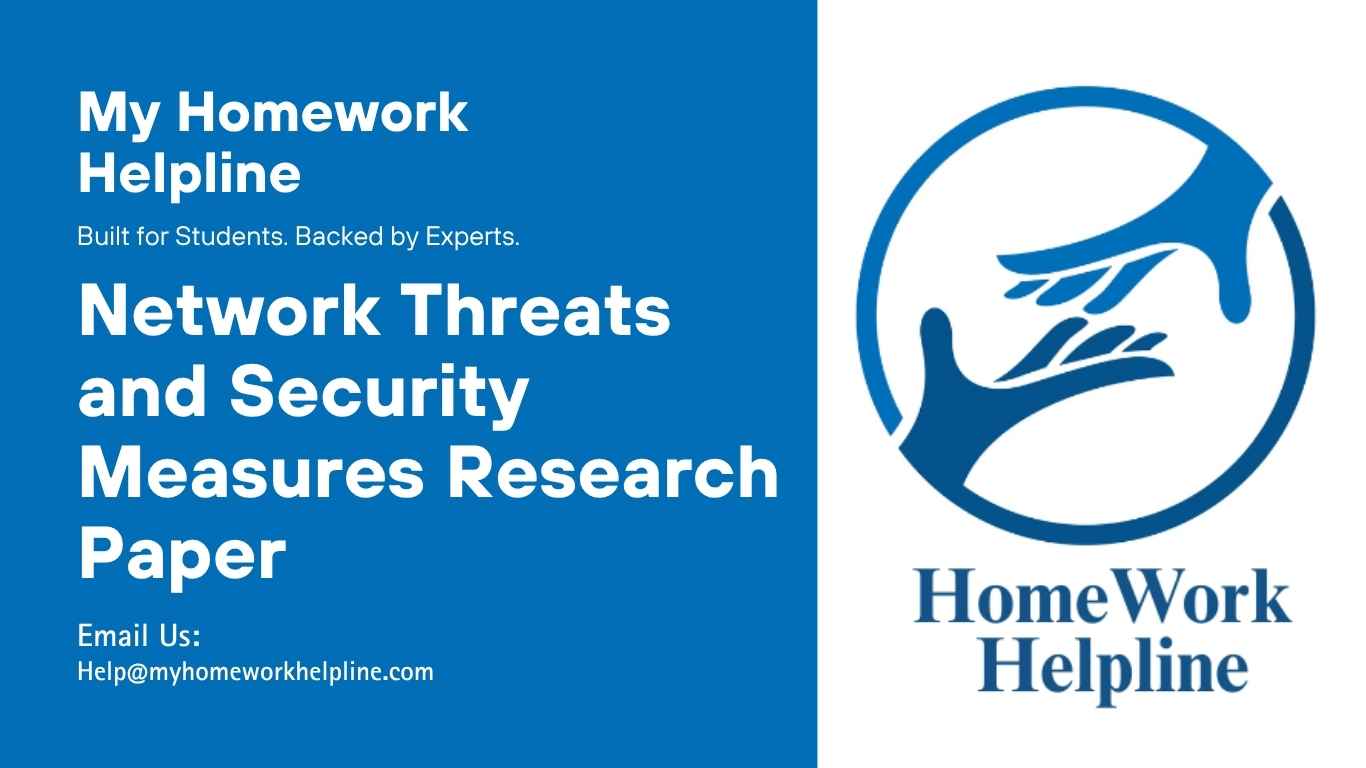Network Threats and Security Measures Research Paper
Wireless networks conduct and get data through radio waves and are thus susceptible to hacking, unlawful interception, and other security issues. One primary threat is spoofing and session hijacking, where an intruder gains access to the network data and resources by using the authorized user’s identity (NI Business Info, 2022). A security measure for such is the installation of standard authentication and encryption, which will ask for a network key or password when a user or device tries to gain access.
Mobile networks enable users to connect from any place with cellular coverage. Their bandwidth is reduced compared to cable networks, and their infrastructure and devices are easily attacked. One major threat is flora and fauna, where computer worms, viruses, and spyware attack and damage internal systems (Radford, 2022). Malware-infected devices may send packets to attempt to infect other devices on the network. A security measure for mobile networks is using application filters that block connection requests to vulnerable applications, thus filtering viruses. Specific packet payloads will also be blocked, minimizing virus infection rates.
Struggling with your computer science research paper or essay on network threats and security measures? Get expert computer science homework assistance from our professional team. Whether you need help analyzing wireless, mobile, IoT, or cloud security risks, explaining encryption and authentication strategies, or completing an academic paper or assignment, we deliver plagiarism-free, accurate, and well-structured support. Make your essays and research papers precise, professional, and insightful with our dedicated homework and assignment help.
Operational Technology (OT) is hardware and software that check and regulate physical devices’ performance. The Internet of Things (IoT) is a network of devices and technology facilitating communication between the devices and the cloud. One of their top threat is DDoS attacks and IoT botnets which may disconnect a firm from its customers, partners, and prospects (Munshi et al., 2020). Botnets are controlled by Command and Control networks that hackers run to launch Distributed Denial of Service (DDoS) attacks. As IoT devices increase, a new generation of botnet DDoS grows, and their effects become more devastating. A security measure for OT or IOT would be the use of Content Delivery Networks (CDNs), which have a detailed view of their traffic and comes with manual programming of an anti-DDoS program.
Organizations have adopted cloud computing to improve their processes. However, such cloud-based platforms have various security challenges, including insecure interfaces. Cloud service providers (CSPs) offer application programming interfaces to their customers. They ensure the interfaces are well-documented to make them easy for their customers to use. Cybercriminals can use documentation to explore methods of accessing sensitive information from a firm’s cloud environment. In addition, a customer may fail to secure the interfaces for the cloud environment properly. One of the best security measures for cloud-based platforms is encryption by a CSP or a cloud security solutions provider (Kaspersky, 2022). A firm may encrypt all cloud-uploaded data or just account credentials. End-to-end encryption ensures that no outsider can access data without the encryption key.
Wireless network security is threatened by spoofing and session hijacking, which can be solved by authentication and encryption. Mobile networks are affected by malware such as viruses and spyware and using application filters limits such threats. OT security is affected by DDoS-botnet attacks, but CDNs can enhance their security with an anti-DDoS solution. Cloud-based platforms may have insecure interfaces, which exposes them to cyber criminals who may steal sensitive data. Encryption can enhance the security of such platforms preventing access to unauthorized users.
The staff and students’ best method to secure their data and devices is encryption. Encryption utilizes a key that only an authorized user may have to access the individual data, increasing their personal security. Encryption keys and passwords should be strong to prevent easy access by unauthorized users. Another way is to install anti-virus and malware protection on their devices and update them when necessary to ensure high security. They should also prevent leaving their devices unattended to make them accessible to unauthorized users. They should also ensure they use a secure connection when accessing the internet. Finally, they should be wary of suspicious emails and links that may be loaded with malware. Factors to look out for are when the email or link calls for urgent action, has terrible grammar, or requests payment (Information Commissioner’s Office, 2022). These methods will enhance their data and device security.
References
Information Commissioner’s Office. (2022). 11 practical ways to keep your IT systems safe and secure. ICO. https://ico.org.uk/for-organisations/sme-web-hub/whats-new/blogs/11-practical-ways-to-keep-your-it-systems-safe-and-secure/
Kaspersky. (2022, March 9). What is Cloud Security? www.kaspersky.com. https://www.kaspersky.com/resource-center/definitions/what-is-cloud-security
Munshi, A., Alqarni, N. A., & Abdullah Almalki, N. (2020). DDOS Attack on IoT Devices. 2020 3rd International Conference on Computer Applications &Amp; Information Security (ICCAIS). https://doi.org/10.1109/iccais48893.2020.9096818
NI Business Info. (2022). Security issues in wireless networks | nibusinessinfo.co.uk. https://www.nibusinessinfo.co.uk/content/security-issues-wireless-networks
Radford, A. (2022, October 27). 10 Mobile Security Threats Leaving a Hole in Your Network. Securus Communications Ltd. https://securuscomms.co.uk/mobile-security-threats/

